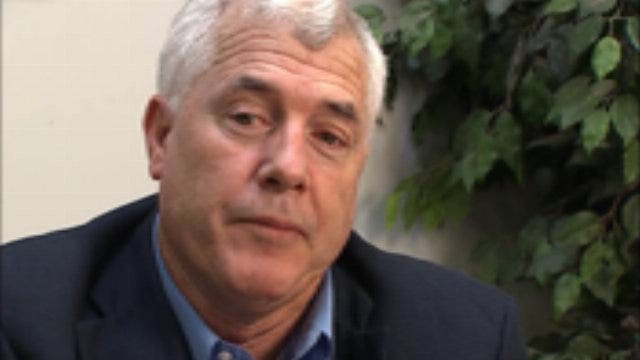
A division of the Oklahoma Corporation Commission came out this week with a report blaming Corporation Commissioner Bob Anthony as well as former legislator Mike Reynolds, of $277 million in additional costs to ratepayers over the 2021 Winter Storm securitization and bond costs.
It led to Reynolds saying he was “astounded” and Anthony calling it a “disgrace to the agency” by people “engaging in efforts to coverup their own wrongdoing.”
The Commission’s Public Utilities Division stated the protests filed with the state Supreme Court over the constitutionality of the securitization law led to ratepayers of utilities paying more for the bonds used by utilities to extend storm cost recovery over the next 25 years or longer.
The Commission’s Director of Administration, Brandy Wreath, who has tangled publicly with Commissioner Anthony over the storm cost numbers, did not name Anthony in his statement but referred to him otherwise.
“I believe it’s important for the public to understand the negative impact of the unsuccessful protests and constitutional challenge supported by one Commissioner and the increased bond costs for ratepayers,” he said.

“It looks like the delay in selling the securitization bonds, caused by these protests, cost ratepayers, conservatively, $277,349,544 due to the 75-basis point interest rate increase by the Federal Reserve during the protests’ timeframe at the Supreme Court. We will never know exactly what might have been. We do know ratepayers will pay more because of the protests.”
But in a July 2022 story in The Oklahoman, it was pointed out that “Corporation Commission staff had projected a weighted average interest rate of 2.5% when the bonding process was approved. OG&E’s bonds will carry an average interest rate of 4.97%.”
While Wreath attacked the constitutional challenges, they were legally allowed under statutes and were intended for ratepayers. The delays alleged by Wreath and the PUD, also involved the Supreme Court and then-Attorney General John O’Connor. At the time, O’Connor did not file any motion in the case led by former Oklahoma City state Rep. Mike Reynolds. It resulted in the Supreme Court chastizing O’Connor and Justices gave him nearly a month to respond. Another delay occurred when the Corporation Commission spent time drawing up a Financing Order involving the bonds, an order that put the risk on ratepayers. During that time, interest rates also rose.
Wreath and the PUD did not make mention of the delays caused by the Supreme Court, O’Connor and the preparation of the Financing Order.
When informed by OK Energy Today of the PUD release, former legislator Reynolds said he was “astounded” that the PUD blamed him with such a claim.
“I wonder if they would also give me credit for $8 bllion in savings had the Supreme Ccourt ruled in my favor or had interest rates gone down.”
He pointed out this is the same Brandy Wreath who believes one-page audits of the expenditure of billions of dollars meets the requirements of the law.
“It is impossible to understand how Brandy Wreath, an employee of the commisson, who quarterbacked the securitization bond scheme, is blasting the public for doing what was authorized in the Act and further authorized in the constitution. Perhaps he’s been watching Judge Juan Merchan way too much—he needs to sit down and shut up.”
Reynolds defended his challenge of the Act saying he and his two-dozen fellow protesters were exercising “our legal rights.”
In a May, 2022 ruling, the Court upheld the February 2021 Regulated Utility Consumer Protection Act and did so in an 8-0 decision against the protesters.
Corporation Commissioner Bob Anthony also responded but did so in a lengthy legal filing.
(file:///C:/Users/User/Downloads/BA-OCCFinalUriCosts-response-wAttachments.pdf)
“The legislature properly and wisely anticipated and allowed for citizen protests against the Winter Storm bond deals in the enabling Securitization Act. Instead of blaming those prescient citizens who, like me, recognized the fiscal time bombs built into the OCC’s recklessly open-ended Financing Orders, Wreath should find a qualified authority to calculate exactly how much
“ratepayers will pay more because of” the securitization scheme he so publicly championed in the weeks after the storm before the OCC had heard a single word of testimony to support it,” declared Anthony in his filing.

“Leaving aside the absurdity of using a “75-basis point interest rate increase by the Federal Reserve” in the Fed Funds Rate it sets for overnight lending to U.S. banks to calculate a change in the interest costs of 30-year ratepayer-backed bonds, I will simply call attention to two earlier filings belying the entire premise that any of the billion-dollar cost overrun from the 2021 Winter Storm bonds can or should be blamed on the citizens who – with good cause and “substantive” arguments explicitly recognized by some of our high court justices11 – exercised their legal rights to protest the bond scheme in front of the Oklahoma Supreme Court,” added the commissioner.
Anthony pointed out that in December 2021, he raised an alternative proposal to use the 10-year treasury rate which was then at 1.44% over 4 to 5 years to spread out the Winter storm costs. But it was dismissed by Commissioner Todd Hiett and then-Commissioner Dana Murphy.
Commissioner Anthony further said under his 2021 proposal, any reduction in the principal resulting from a proper investigation of “the outrageous natural gas prices” that led to the winter storm fuel costs would have reduced the interest expenses. But under the Securitization Act and the OCC’s Financing Orders, there is no mechanism for clawing back the finances.
“Let there be no doubt about it: The OCC is broken. Spurious public statements such as those running rampant through the Commission’s May 29, 2024 “news release” are a disgrace to the
agency personnel who are abiding by the Oklahoma Constitution while performing the duties of this agency, instead of engaging in efforts to coverup their own wrongdoing.”
He called the statement by Wreath and PUD Director Mark Argenbright a “disservice to ratepayers, regulated companies and other agency stakeholders.”
“I will waste no further time on this gross display – whether of ineptitude, regulatory capture or desperate self-preservation, others will one day decide.”
In the initial release by the Commission, the Public Utility Division said it had compiled the final costs to issue the securitization bonds to pay for Winter Storm Uri. The totals came in $1.4 million under the approved estimates.
The 2021 extreme weather event left ratepayers facing exceedingly high utility costs when the natural gas spot market price jumped from around $3 per thousand cubic feet to a record high of more than $1,200 per thousand cubic feet.
“Publishing this data is not any entity’s statutorily mandated role,” PUD Director Mark Argenbright said. “Regardless, we have worked with all parties, the utility companies and the Oklahoma Development Finance Authority (ODFA), to keep ratepayers abreast of the actual costs related to the sale of these bonds.”
PUD began compiling preliminary cost estimates based on a range authorized by the Commission, the calculated impact created by the Supreme Court protests and now, the final numbers (here). This information has been posted on the OCC webpage.
There were two parts to the OCC’s role in the securitization process. Part One consisted of the origination cases where parties reviewed, and heavily litigated, storm expenses for prudency and recommended alternatives for long-term treatment leading up to the Commission approved financing orders utilizing securitization. Numerous projected costs were reviewed by all parties with ranges recommended for long-term interest charges and line-item expenses. These expenses, itemized in the linked reports, cover expenses such as legal work, financial firms who service the bonds, and other related activities.
Part Two is the ongoing statutory audit of utility collections from ratepayers for debt repayment to the bond servicing agent. PUD prepares a summary of its audit of utility company collection and payment compliance to be provided to the Governor, Speaker of the House, and Senate President Pro-Tempore. The statutorily required “one-page” compliance report has been maligned and mischaracterized in multiple case filings and news releases as the totality of the work, rather than the summary thereof.
“The numbers now posted to the web page are the final costs to issue the bonds that were originally litigated in Part One,” Argenbright said. “The Commission initially received estimates as to what various elements would cost. The actual costs – now final because all invoices have been processed – show that, in total, all four utilities came in $1.4 million below approved estimates.”
This is important to note as previous media coverage included inaccurate allegations of a billion-dollar overrun in securitization costs, professed the release.
In addition to posting the final numbers, PUD included links to the recently received Report of Independent Accountants from each of the utility’s independent third-party accounting firms. Visitors to the website can scroll down the page to see each third-party review under the a utility’s tab.
The PUD release said the extreme conditions produced by Uri and the life-threatening greed alleged of market-manipulating marketers, currently being investigated by Attorney General Drummond, left Oklahoma ratepayers with a monthly payment stretching out for up to 25 years. This long-term repayment method created by legislation was supported and recommended by most parties to the original cases, and a majority of the Commission, to reduce the financial impact on a monthly basis to Oklahoman’s already struggling to make ends meet.
Despite the potential profiteering by some marketers, at remorseless risk to Oklahomans sheltering from their ice-covered world, the utility companies, who did not profit from the increased commodity costs, kept the gas flowing and the lights on. More importantly, unlike the situation in neighboring states, nobody in Oklahoma died because of a lack of utility services, as supported by the Commission’s Order to prioritize life, health, and safety.
“I am beyond proud of the work done by PUD, the supportive Commissioners, ODFA, the Office of the Attorney General, and numerous other stakeholders that worked together to turn this potentially deadly storm into a manageable outcome,” Wreath said. “In Oklahoma, the public utilities preserved life and provided safe and reliable service in the face of intractable fuel prices.”




